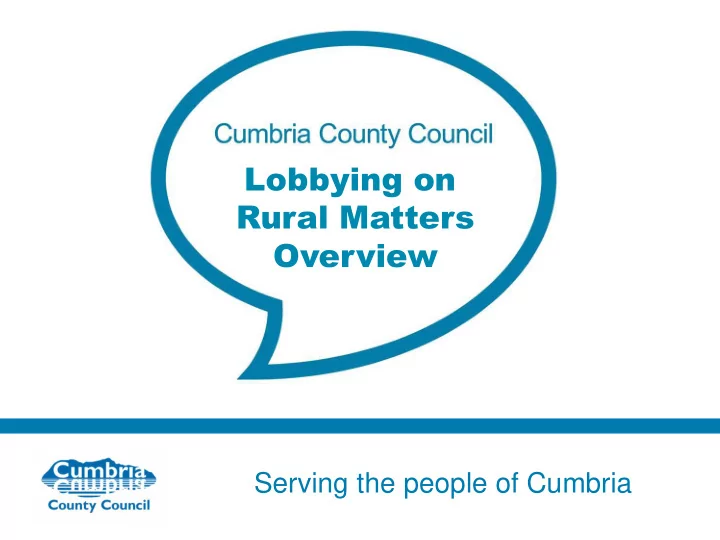

Lobbying on Rural Matters Overview Serving the people of Cumbria
National Picture • Rural areas are reporting disproportionate impacts of budget cuts due to higher service costs • Rural communities are seen to be experiencing worse outcomes in a diverse range of areas such as education, transport and accessing healthcare • These areas are experiencing a continuous flow of those classed as economically active leaving for larger metropolitan areas • Has resulted in calls on Government to produce a cross-departmental strategy to address challenges rural areas face Serving the people of Cumbria
Current Policy Position • Government rejected calls for a rural strategy • Local Industrial Strategies are promoted as the vehicles for rural economic growth • Government commit to cross-departmental rural-proofing as part of policy making • Launch of digital skills partnerships • Continued uncertainty around developments with the Shared Prosperity Fund Serving the people of Cumbria
Organisations • Rural Services Network. • Britain’s Leading Edge Serving the people of Cumbria
Serving the people of Cumbria
Serving the people of Cumbria
Promoting Cumbria’s views with RSN Serving the people of Cumbria
Feedback for Rural Service Network’s response to Government in relation to the Lord’s Select Committee Inquiry on the Rural Economy. Ensuring that new rural measures state who across Government is accountable for their performance; Defra’s Rural Affairs Board is included as part of the sign off process for Local Industrial Strategies, helping to strengthen rural proofing activity; MCHLG’s planning guidance considers the needs of young families in rural areas so housing is available that families can grow into; Ensuring Government consults with the Rural LEPs Network to ensure rurality is considered in policy making; Future improvements to mobile networks ensures that rural infrastructure is ready for 5G roll out; Serving the people of Cumbria
Feedback for Rural Service Network’s response to Government in relation to the Lord’s Select Committee Inquiry on the Rural Economy. Rural business hubs are located in accessible places and have the digital infrastructure required to support digital skills development and digital entrepreneurialism; Affordable housing quotas in rural areas should be based on local income levels to ensure affordability; Rural post offices should be required to use a proportion of their income from handling bank transactions to support the development of community hubs where rural communities can access a range of services in one place; The proposed spending review planned for 2020 should include dedicated funding to support rural bus services and public transport infrastructure. Serving the people of Cumbria
A collaboration of 12 upper tier rural authorities led by Cornwall Council Serving the people of Cumbria
• Government policy often fails to pay due regard to the interests of rural areas: Unfa nfair fund funding currently underappreciate rural delivery costs; Gove overnment po policies, , prog programmes and and inv nvestment ha have a a city bi bias as, particularly for large cities. This has been a common barrier (sometime explicitly) to progressing asks within New Frontiers. • In spite of Government’s positive response to Lord Cameron’s 2017 review, there is still mu much mo more re to to be be do done ne to to ma main instream rur rural l proo proofin fing. • The new commitments to ‘level up’ the country, and the post - Brexit salience of ‘left behind’ places presents an op oppo portunit ity to to ma make ou our r voice oice hea heard. • A need to re refr frame the the stor tory of of rur rural l ar areas away from just rural deprivation towards the rural offer – enabling rural communities and businesses to fully and fairly contribute to, and benefit from, economic and productivity growth. Serving the people of Cumbria
The challenge: tackling rural stereotypes Serving the people of Cumbria
The challenge: the ‘policy corridor’ Serving the people of Cumbria
The network Serving the people of Cumbria
Strength in numbers Northumberlan d Members authorities Population: Durham Fulfil membership 319,030 Population: criteria 4 MP’s 523,662 Cumbria 7 MP’s North Population: Yorkshire 498,375 Population: 6 MP’s 611,633 Shropshire 6 MP’s Population: East Riding 317,459 Population: 3 MP’s 338,061 5 MP’s Herefordshire Lincolnshire Population: Population: 191,041 2 MP’s 751,171 7 MP’s Rutland Population: Somerset 39,474 Population: 1 MP 505,579 5 MP’s Central Bedfordshire Population: 280,030 Isles of 3 MP’s Scilly Wiltshire Population Population: : 2,259 496,043 0.5 MP’s 7 MP’s Cornwall Dorset Isle of Wight Population Population: Population: : 561,349 Serving the people of Cumbria 424,667 140,984 5.5 MP’s 4 MP’s 1 MP
National engagement • Tomorrows society, today report was launched at the LGA conference in early July, with a roundtable of authorities, sector leaders and partners, supported by Localis. A parliamentary launch was hosted by Sarah Newton MP later in July with MP’s from across Britain’s Leading Edge. Work is now ongoing to raise awareness amongst political leaders and senior civil servants. Serving the people of Cumbria
Press coverage Serving the people of Cumbria
Ambitions • Achieving recognition of the distinctive offer of our areas , whose development is essential for rebalancing the economy and uniting the country. • Achieving recognition of the role of the city-weighted ‘policy - corridor’ focused interventions, and an overreliance on Mayoral Combined Authorities in maintaining or exacerbating the spatial challenge. • Achieving Government recognition of the policy opportunities that could address the challenge, including decentralisation through rurally-suitable devolution; a needs- sensitive Shared Prosperity Fund based on a simple, fair and transparent allocation mechanism with a view to rebalancing the economy; and support for Local Industrial Strategies that harness the distinctive contribution of these areas to a sustainable, inclusive and resilient future economy. • To achieve investor recognition of the development potential and opportunities of these areas in tackling the IS Grand Challenges. Serving the people of Cumbria
Recommend
More recommend